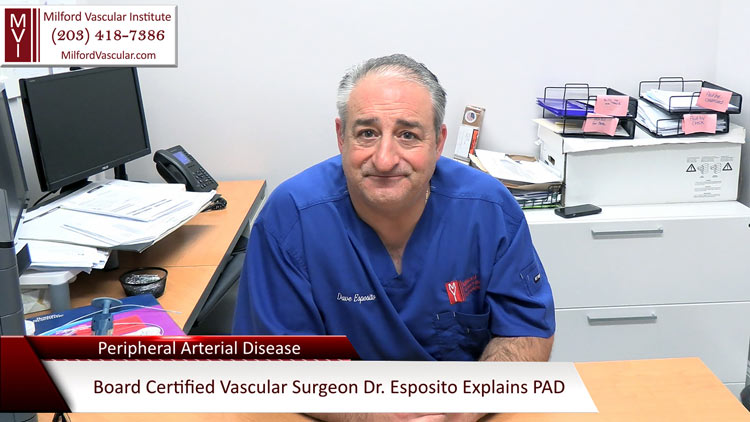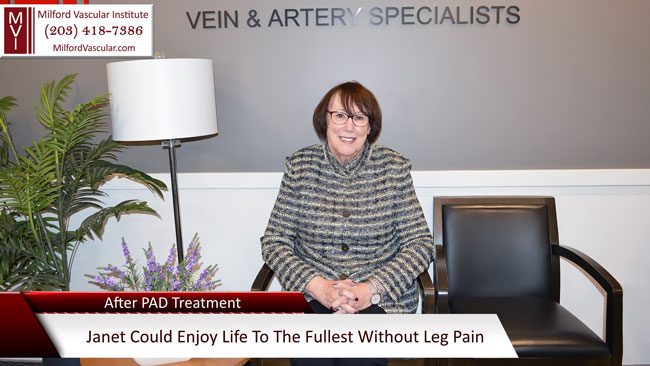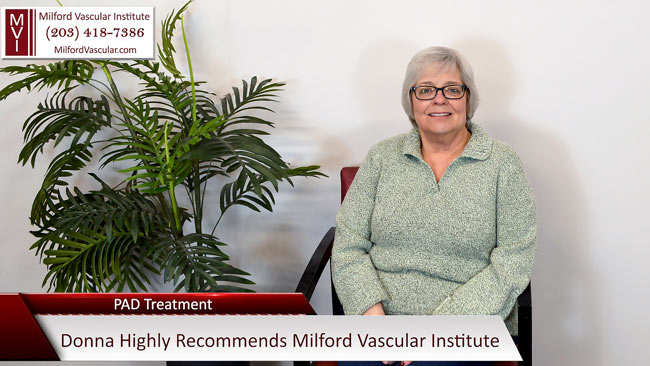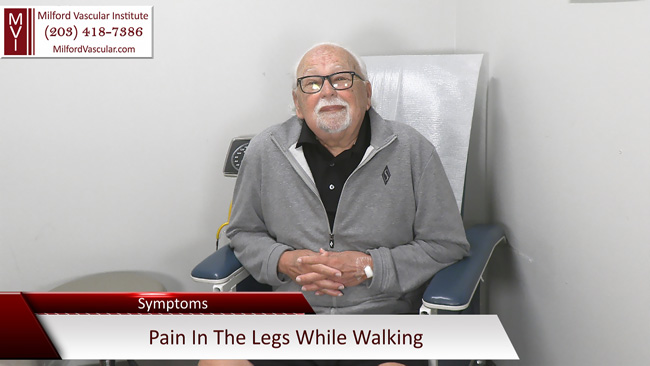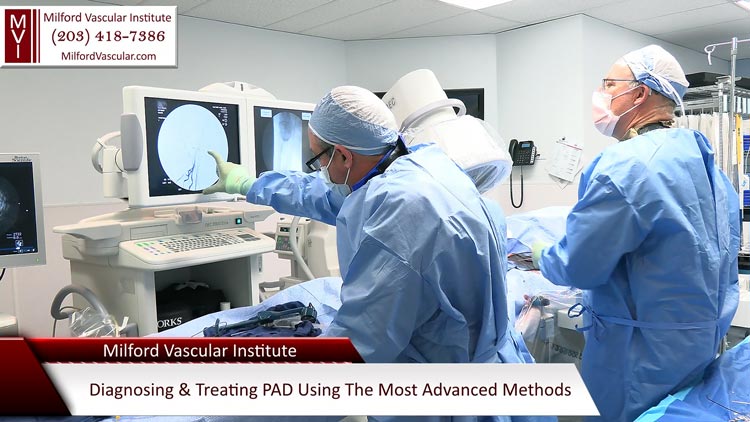Peripheral Artery Disease (PAD)
Causes Pain While Walking That Is Relieved With Rest
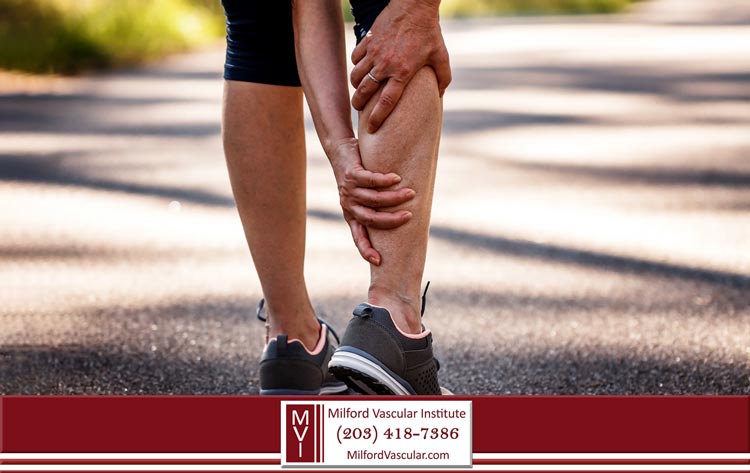
Peripheral artery disease, also referred to as PAD is a vascular disorder in which plaque builds up inside the leg arteries.
The plaque buildup causes constricted blood flow in the leg arteries, preventing healthy circulation to the lower legs.
The most evident symptom of PAD is claudication, pain in the legs while walking that goes away when you stop and rest.
At Milford Vascular Institute our vascular specialists are peripheral artery disease experts. They can quickly and easily diagnose your PAD.
Treatments of PAD include lifestyle modifications, medications, minimally-invasive outpatient procedures, as well as PAD surgeries such as artery bypass.
LEFT UNTREATED PERIPHERAL ARTERY
DISEASE CAN LEAD TO GANGRENE AND LEG AMPUTATION
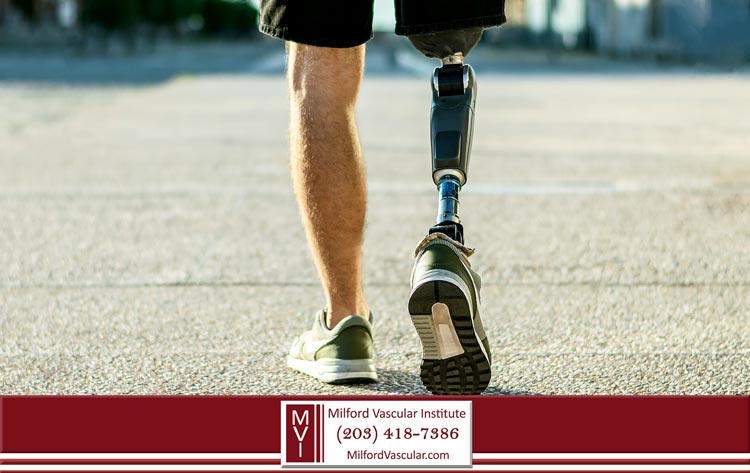
So, if you are experiencing leg pain or leg cramps while walking, it is recommended to have a vascular consultation as soon as possible to help determine if your symptoms may be due to blockage in one of your leg arteries.
Board Certified Vascular Surgeon Dr. Esposito Explains Peripheral Arterial Disease
“PAD occurs when people develop a blockage in one of their leg arteries due to plaque buildup. Plaque buildup in an artery causes a constriction of flow throughout the artery.
There are multiple risk factors for developing plaque. The number one is smoking. The others are high blood pressure, diabetes, hypercholesterolemia, as well as having a family history of PAD.
Claudication is the most common symptom of PAD (blockage in a leg artery). What claudication is, is people start to walk, and at a certain distance, they start to get cramping in their calves. And when they stop walking, that cramping goes away.”
~ Dr. David Esposito
Board Certified Vascular Surgeon
“In the last 20, 25 years, there’s really been a revolution in how we take care of patients diagnosed with PAD. And we do that in a minimally-invasive way, what we would call endovascular, meaning working from the inside of the blood vessel.
So rather than doing a big operation, what we can do is get into the blood vessel through a needle and fix the blood vessel from the inside. And we have numerous ways we can do that, using various balloons and stents and roto-rooter devices, where we can core out the blockages and remove the blockages that way and open up the blood vessel, but do it in a way that’s minimally-invasive.
Early diagnosis and early treatment can help prevent the progression of the disease, because peripheral arterial disease, untreated, can lead to worse things, which is constant pain and even tissue loss, meaning gangrene and eventually amputation. So that’s what we’re trying to prevent as vascular surgeons.”
~ Dr. David Esposito
Board Certified Vascular Surgeon
PAD Treatment Patient Testimonials
Patients Janet, Donna and Bob Share Their Experiences Having PAD Treatment With Dr. Esposito and Dr. Davis at Milford Vascular Institute
What is Peripheral Artery Disease?
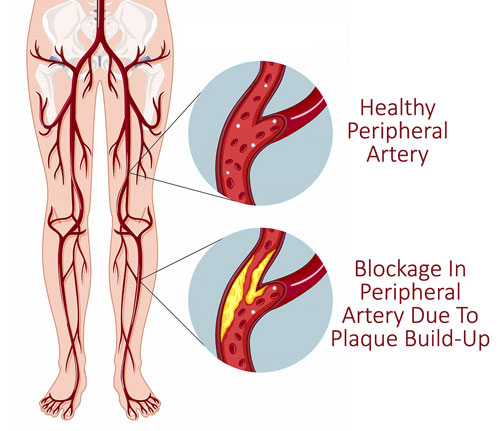
Peripheral arterial disease, also known as PAD, is a condition in which plaque builds up inside the leg arteries. This causes a constriction of blood flow within the artery.
The arteries carry blood that is rich in oxygen and nutrients down from the heart to the legs.
When blood flow to the legs becomes constricted due to PAD it can result in leg pain and leg cramps while walking. With the lower leg deprived of oxygen and nutrients, the tissue in the leg can start to die and lead to amputation.
What Are The Causes of Peripheral Artery Disease?
The number one cause of PAD is smoking. The following risk factors make you more prone to developing arterial blockages in the peripheral arteries:
If you think you may be at risk of developing PAD, a simple consultation with one of our vascular specialists can help determine if you have developed blockage in your peripheral arteries.
What Are The Symptoms of PAD?
During the early stages of peripheral arterial disease, it is common for patients to experience no symptoms at all. However, as PAD progresses, the following symptoms may be expected:
If you have been experiencing any of these symptoms, at Milford Vascular Institute, we can quickly and easily evaluate your condition and determine if you have peripheral artery disease.
Early diagnosis and treatment are highly recommended to prevent tissue loss in the leg, put an end to your leg cramps and maintain your quality of life.
Free Testing For PAD at Milford Vascular Institute
At Milford Vascular Institute we truly care about the vascular health of the people in our community.
That is why we offer free vascular screenings to determine if you may have blockage in one of your leg arteries.
FREE PERIPHERAL ARTERY DISEASE SCREENING
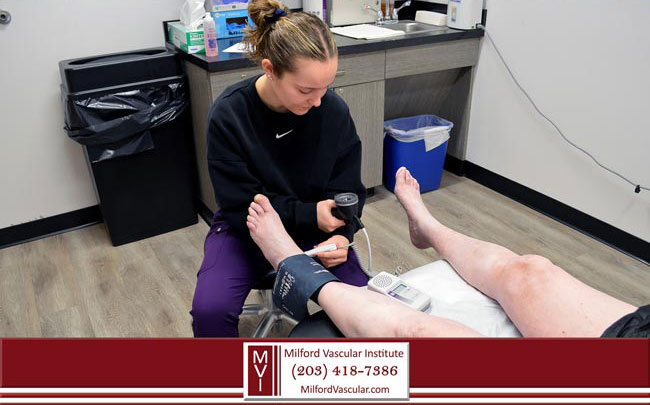
When you come to Milford Vascular Institute for your free vascular screening, we will measure the blood pressure in your legs and arms to check if you have reduced pressure in one or both of your legs. This would be an indication of possible arterial blockage in one of your leg arteries.
We will perform a vascular ultrasound to check for blockages in the leg arteries as well.
If, based on the results of your vascular screening, you are diagnosed with PAD, our vascular specialists will work with you to get you on a path to treating your PAD.
The treatment process consists of:
1. lifestyle modifications (stop smoking, control of high blood pressure, diabetes and cholesterol, if applicable)
2. medications to thin your blood, which can help reduce your symptoms
3. minimally-invasive outpatient procedure to unblock your blocked arteries
4. peripheral artery disease surgery such as leg artery bypass surgery to restore healthy blood flow
Using The Most Advanced
Technology Available Anywhere To Treat Peripheral Arterial Disease
Here at Milford Vascular Institute, our top-rated vascular specialists serving Milford, New Haven, Bridgeport, Stamford and all of Southern Connecticut, use the most advanced minimally-invasive techniques available anywhere in the world to treat peripheral arterial disease.
WATCH DR. ESPOSITO & DR. DAVIS UNBLOCK THIS PATIENT'S COMPLETELY BLOCKED LEG ARTERY
This 77-year-old patient was experiencing pain while walking that was relieved with rest.
After performing blood pressure tests and an ultrasound in our office, it was discovered that she had blockage in her leg artery. We diagnosed her with peripheral arterial disease.
At Milford Vascular Institute’s office-based laboratory, board certified vascular surgeon Dr. Esposito, and board certified interventional radiologist Dr. Davis discovered that one of her leg arteries was completely blocked by plaque.
This was preventing healthy blood circulation to her lower legs, and causing her leg cramps when walking.
Using the most advanced endovascular surgery methods available anywhere in the world, and by applying their skillful techniques, they were able to restore full blood flow through the blocked artery once again.
BEFORE AND AFTER PAD TREATMENT TO UNBLOCK BLOCKED LEG ARTERY
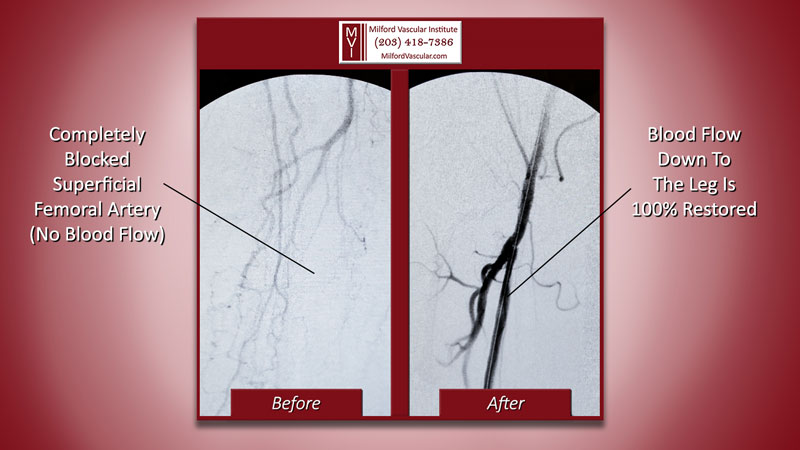
This outpatient procedure was appropriate for her since she suffers from other health problems that would have made PAD surgery too risky for her.
With this minimally-invasive PAD procedure, she was under light sedation, thereby avoiding any risk of full anesthesia. In addition, she had no downtime after the procedure and was able to resume her normal activities right away.
With healthy circulation restored through her leg, her symptoms of leg pain will resolve immediately. She will enjoy an improved quality of life and will be able to walk without pain again.
Why Choose
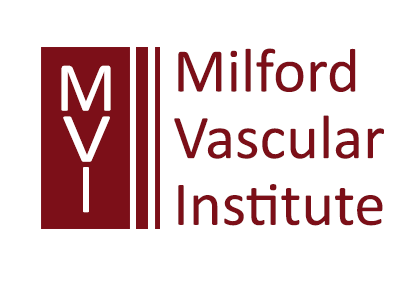
When you choose Milford Vascular Institute for treatment of peripheral arterial disease (PAD), you can rest assured that you are getting the very best possible vascular care available in all of New Haven County. Our vascular specialists are highly skilled in providing the most advanced, minimally-invasive vascular treatments available anywhere.
At MVI, board certified vascular surgeon Dr. David Esposito and Dr. Paul Davis, who is board certified in diagnostic radiology, and vascular and interventional radiology, will perform your PAD treatment in our office-based laboratory.
Dr. Esposito and Dr. Davis are top-rated experts in endovascular treatments. They are always at the forefront of technology in the vascular surgery field to ensure they are providing the best, cutting-edge vascular treatments to their community.
And if you require PAD surgery such as leg artery bypass or surgical plaque removal, Dr. Esposito has the expertise and experience to care for you in a hospital setting as well.
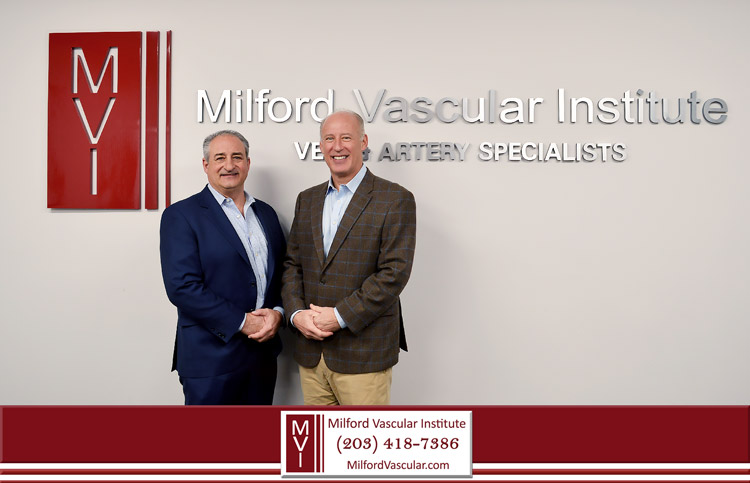
With over 50 years of combined experience in diagnosing, preventing and treating vascular diseases, our outstanding vascular specialists have dedicated their lives to caring for you.
With over 20 years in practice, at Milford Vascular Institute, our staff is committed to excellent patient care. We always treat our patients with respect and compassion because WE CARE.

Our MVI Team ~ Always Treating You Like Family
If you’ve started to experience leg pain and leg cramps while walking, or any of the symptoms associated with peripheral arterial disease (PAD), it is important to have an evaluation with a vascular specialist as soon as possible. If left untreated, PAD can eventually lead to gangrene that may require amputation.
Through a simple in-office consultation, a blood pressure test and ultrasound, we can determine if your symptoms are due to a blockage in the leg arteries (PAD). If so, we can easily diagnose and often unblock your artery right in our office-based laboratory.
Treatment takes less than an hour to perform, is minimally-invasive, and performed on an outpatient basis under light sedation.
You will be able to go home and resume normal activities, with no downtime and quick recovery.
To schedule a consultation with one of our top-rated vascular specialists here at Milford Vascular Institute, give us a call today at (203) 418-7386. It will be our pleasure to care for you.

